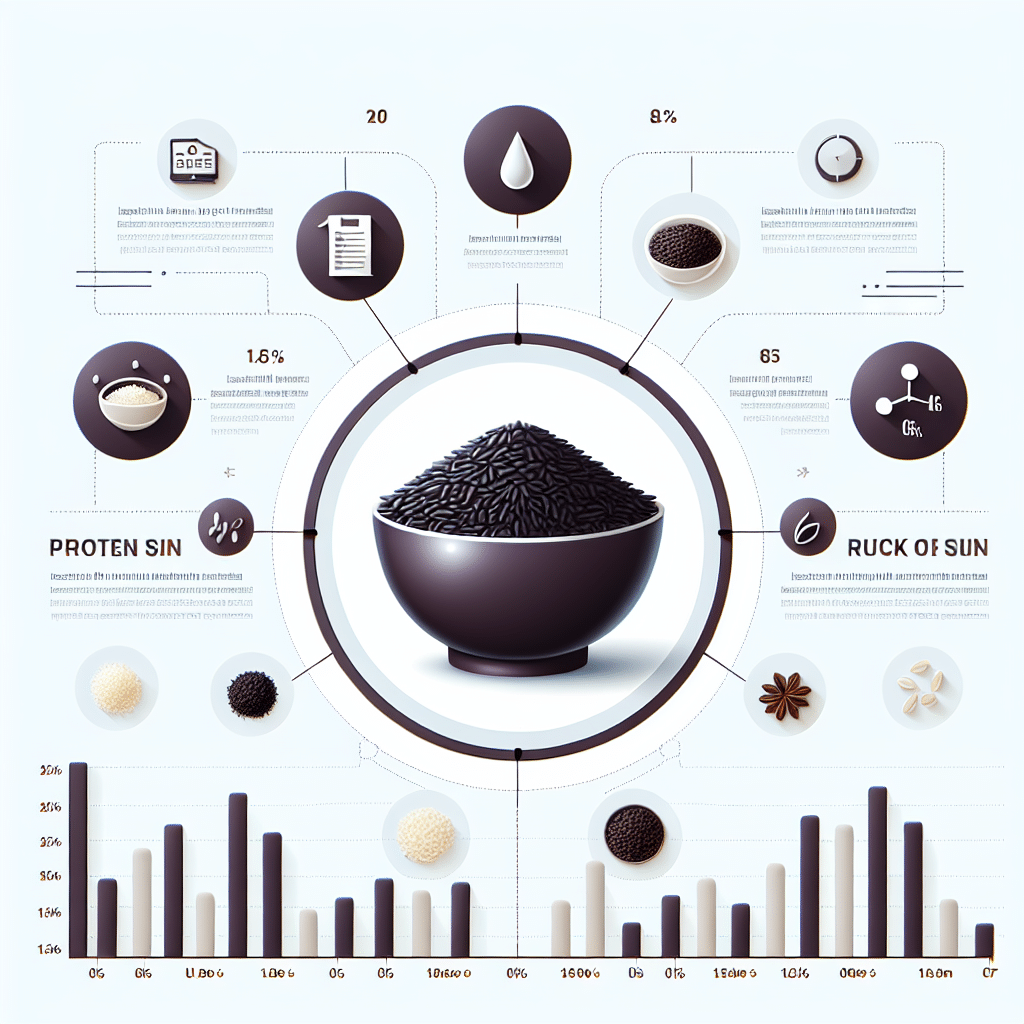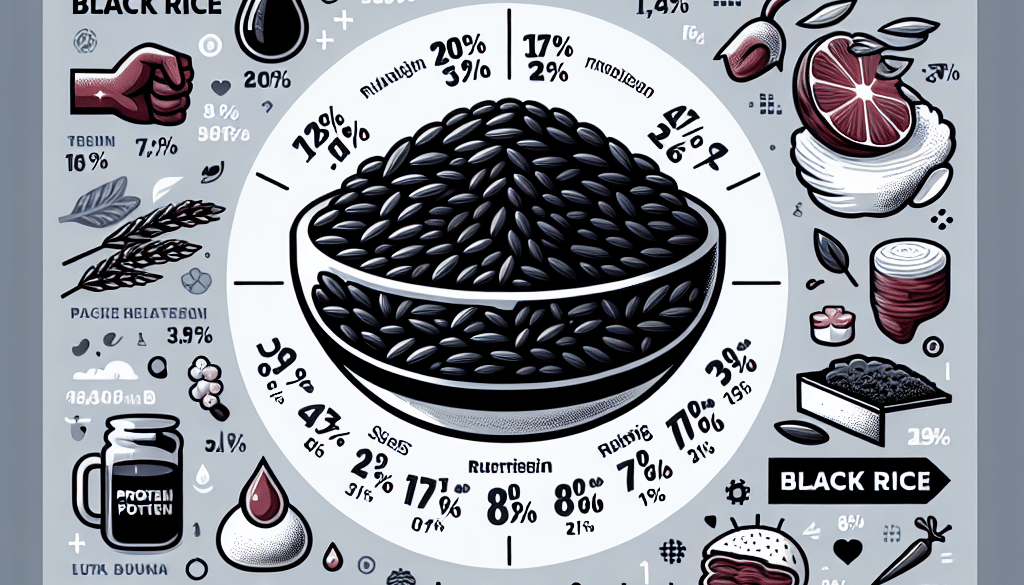ls black rice high in protein?
-
Table of Contents
- Is Black Rice High in Protein? Unveiling the Nutritional Profile
- Understanding Black Rice and Its Nutritional Value
- Protein Content in Black Rice
- Comparing Black Rice to Other Protein Sources
- Benefits of Protein in Black Rice
- Additional Health Benefits of Black Rice
- Incorporating Black Rice into a High-Protein Diet
- Case Studies and Research
- Conclusion: The Role of Black Rice in Protein Consumption
- Discover ETprotein’s High-Quality Protein Products
Is Black Rice High in Protein? Unveiling the Nutritional Profile

Black rice, often referred to as ‘forbidden rice’ due to its historical consumption by royalty in ancient China, has gained popularity in the health food sphere. Its unique color, nutty flavor, and nutritional benefits make it a sought-after alternative to white and brown rice varieties. One of the questions that health-conscious individuals often ask is whether black rice is a good source of protein. This article delves into the protein content of black rice and its place in a balanced diet.
Understanding Black Rice and Its Nutritional Value
Black rice, scientifically known as Oryza sativa L., is a whole grain with a deep purple-black hue, which is a result of anthocyanin content, the same antioxidant found in blueberries and blackberries. This pigment not only gives black rice its striking color but also contributes to its antioxidant properties.
Protein Content in Black Rice
When it comes to protein, black rice is often considered a moderate source. On average, a 100-gram serving of cooked black rice contains approximately 3 to 4 grams of protein. While this may not seem like a high amount, especially when compared to other protein sources like meats or legumes, it is comparable to other types of rice. For instance, white rice contains about 2.7 grams of protein per 100 grams, while brown rice offers around 2.6 grams for the same serving size.
Comparing Black Rice to Other Protein Sources
It’s important to compare black rice to other protein sources to understand its role in a protein-rich diet. Animal-based proteins, such as chicken, beef, and fish, typically provide between 20 to 30 grams of protein per 100-gram serving. Plant-based proteins, such as lentils and chickpeas, offer around 9 grams of protein per 100 grams. Compared to these sources, black rice has a lower protein content. However, it can still contribute to the overall protein intake when combined with other protein-rich foods.
Benefits of Protein in Black Rice
Despite its moderate protein content, the protein in black rice is valuable due to its inclusion of essential amino acids, which are the building blocks of proteins that the body cannot synthesize on its own. Including black rice in your diet can help ensure you get a complete spectrum of these amino acids, especially when paired with other plant-based proteins.
Additional Health Benefits of Black Rice
Black rice is not only about protein. It boasts a range of other health benefits that make it a nutritious addition to any diet:
- Rich in Antioxidants: Black rice is high in anthocyanins, which have been linked to a reduced risk of chronic diseases like heart disease, cancer, and diabetes.
- Dietary Fiber: With more fiber than white rice, black rice can help improve digestive health and promote a feeling of fullness, aiding in weight management.
- Iron and Minerals: It is a good source of iron, which is essential for transporting oxygen in the blood, and also contains other minerals like magnesium and phosphorus.
- Low Glycemic Index: Black rice has a lower glycemic index than white rice, making it a better choice for blood sugar control.
Incorporating Black Rice into a High-Protein Diet
For those looking to increase their protein intake, black rice can be part of a balanced diet. Here are some ways to incorporate black rice into meals:
- Combine black rice with beans or lentils to create a complete protein meal.
- Use black rice as a base for stir-fries or bowls, adding in tofu, chicken, or fish for additional protein.
- Mix black rice with quinoa, another high-protein grain, for a nutritious side dish.
- Create black rice salads with chopped nuts and seeds, which are also high in protein.
Case Studies and Research
Several studies have highlighted the nutritional benefits of black rice. For example, research published in the Journal of Agriculture and Food Chemistry found that the anthocyanins in black rice could help reduce inflammation and protect against heart disease. Another study in the journal Food Chemistry noted that black rice has higher amounts of amino acids than white rice, emphasizing its potential as a protein source in vegetarian and vegan diets.
Conclusion: The Role of Black Rice in Protein Consumption
While black rice is not the highest source of protein available, it is a valuable grain that can contribute to protein intake, especially when combined with other protein-rich foods. Its additional health benefits, such as high antioxidant content and dietary fiber, make it a nutritious choice for those looking to diversify their diet. By understanding how to incorporate black rice into meals, individuals can enjoy its unique flavor and nutritional advantages while maintaining a balanced and protein-rich diet.
Discover ETprotein’s High-Quality Protein Products
If you’re looking to enhance your protein intake with high-quality supplements, consider exploring ETprotein’s range of products. ETprotein specializes in organic bulk vegan proteins that are non-GMO and allergen-free, ensuring you receive the best in terms of both taste and nutrition. Their offerings include Organic rice protein, pea protein, and various seed proteins, all characterized by their neutral taste and high purity levels.
For those interested in the benefits of L-(+)-Ergothioneine (EGT), ETprotein also provides this compound in various grades suitable for the nutraceutical, pharmaceutical, and cosmeceutical industries. Whether you’re a distributor, trader, or manufacturer, ETprotein can meet your protein needs with their extensive product range and commitment to quality.
About ETprotein:
ETprotein, a reputable protein and L-(+)-Ergothioneine (EGT) Chinese factory manufacturer and supplier, is renowned for producing, stocking, exporting, and delivering the highest quality organic bulk vegan proteins and L-(+)-Ergothioneine. They include Organic rice protein, clear rice protein, pea protein, clear pea protein, watermelon seed protein, pumpkin seed protein, sunflower seed protein, mung bean protein, peanut protein, and L-(+)-Ergothioneine EGT Pharmaceutical grade, L-(+)-Ergothioneine EGT food grade, L-(+)-Ergothioneine EGT cosmetic grade, L-(+)-Ergothioneine EGT reference grade and L-(+)-Ergothioneine EGT standard. Their offerings, characterized by a neutral taste, non-GMO, allergen-free attributes, with L-(+)-Ergothioneine purity over 98%, 99%, cater to a diverse range of industries. They serve nutraceutical, pharmaceutical, cosmeceutical, veterinary, as well as food and beverage finished product distributors, traders, and manufacturers across Europe, USA, Canada, Australia, Thailand, Japan, Korea, Brazil, and Chile, among others.
ETprotein specialization includes exporting and delivering tailor-made protein powder and finished nutritional supplements. Their extensive product range covers sectors like Food and Beverage, Sports Nutrition, Weight Management, Dietary Supplements, Health and Wellness Products, and Infant Formula, ensuring comprehensive solutions to meet all your protein needs.
As a trusted company by leading global food and beverage brands and Fortune 500 companies, ETprotein reinforces China’s reputation in the global arena. For more information or to sample their products, please contact them and email sales(at)ETprotein.com today.












